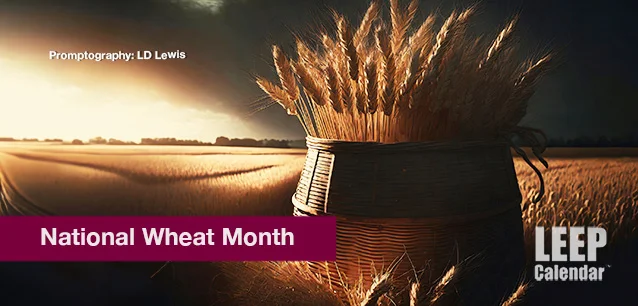 AD
AD
Today is: December 24
Scroll to explore events active on this date.
Additional Events on LEEP
LEEP INK FEATURES

August? Absolutely!
In August, we live through the Dog Days of Summer. It's hot and often humid, and those who can leave for better climates do. Down south, winter is in full force. August is also known as "the ...

In The Heat of July: July 2025 Events
Is it hot enough (or cold enough if you're below the equator) for you yet? There is actually a day for that! Like every month, I pick a diverse collection of events you may or may not know about. This ...

May Blooms: Events in May 2025
Along with October, May is one of the most densely packed months of the year. It's before the summer humidity and the last whole month of the school year. The weather is warming in t...
About Wheat Month
Retail , United States
Ends: Jul 31, 2024
DESCRIPTION:
July is Wheat Month.
Wheat, a cornerstone of human civilization, has a storied history that dates back thousands of years. This versatile grain, believed to have originated in the Tigris and Euphrates river valleys of the Middle East, was one of the first crops to be domesticated by humans around 10,000 years ago. The cultivation of wheat marked a pivotal shift from nomadic lifestyles to settled farming communities, laying the foundation for the rise of ancient civilizations.
The journey of wheat from its ancient beginnings to its status as a global staple is a testament to its adaptability and utility. The ancient Egyptians, renowned for their agricultural innovations, were among the first to master the art of wheat cultivation and bread-making. The grain was a dietary staple in ancient Egypt and held cultural and religious significance. The Greeks and Romans further propagated wheat cultivation throughout Europe, and with the advent of the Roman Empire, it became an integral part of the European diet.
Wheat has maintained its prominence as a primary food source in modern times. It is the basis for many products, including bread, pasta, noodles, cereals, and pastries. Wheat flour, obtained by grinding the grain, is a fundamental ingredient in baking, known for its gluten content, which gives dough its elasticity and strength.
The diversity of wheat varieties, such as hard red winter wheat, soft wheat, and durum wheat, cater to different culinary needs. Hard wheat varieties, with higher gluten content, are preferred for bread-making, while softer varieties are used for pastries and crackers. Durum wheat is ideal for pasta production with its high protein and gluten strength.
Wheat's significance extends beyond its culinary uses. It plays a vital role in the global economy, with major wheat-producing countries like Russia, the United States, and China influencing world markets. The grain's sensitivity to weather conditions and its impact on international trade often make it a subject of economic and political importance.
The story of wheat is one of human progress. From ancient river valleys to modern farms, its cultivation has been central to human development. As a staple food for over a third of the world's population, wheat continues to be fundamental to global food security and cultural practices, shaping diets and lifestyles across the globe.
VIDEOS
SUPPORTING DOCUMENTS
Currently, this event does not have supporting documents.
ADDITIONAL IMAGES
Currently, this event does not have supporting images.
Where would you like to go now?
 AD
AD


/footer-logo.svg)
